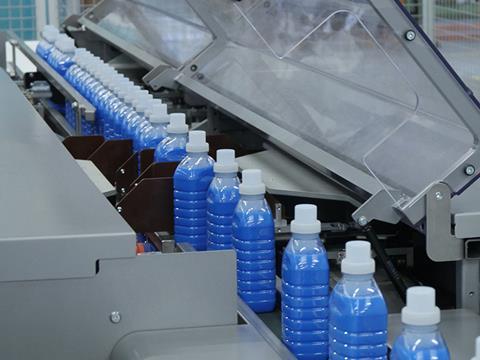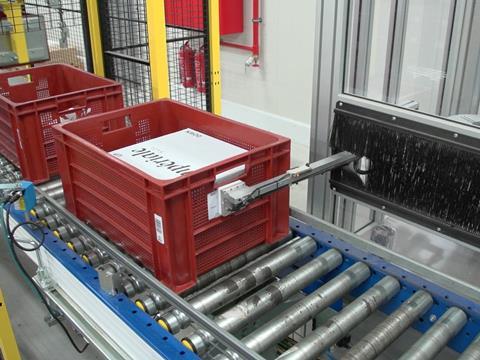
The end of line machinery sector has experienced increased demand over recent years, with companies in different industries discovering the advantages that these machines can bring when customers are looking for integration, automation, smart machines and Industry 4.0 applications. Elisabeth Skoda learns more about trends and innovations in the sector from Alvey Group, Qimarox, Endoline Machinery and Gebo Cermex.
Andrew Yates, sales director at Endoline Machinery, observes that more companies are pushing to automate their end of line production facility, due to the rise in the minimum wage, with the majority of companies, who previously may not have even considered automation, looking to integrate automated systems and robotics, removing the requirement for manual operation.
“Internationally, price is still a big driver with UK manufactured machines considered expensive, however, the UK does have a good reputation for manufacturing quality end of line machines. There is a growing trend towards adopting automation to reduce labour due to higher wage legislation.”
He notices that in recent months, the company received enquiries from outside its food core business.
“Consumer trends are constantly evolving, and retailers are placing greater pressure on manufacturers to pack products into different packaging formats and styles to keep up with specific demands. As a result, there has been greater demand for systems which offer flexibility, as companies look to future proof their automation investment. To this end, random, high speed, end of line systems have become more sought after. Along with flexibility, we are also being asked about ease of operation, as quite often we’re selling in to companies as a first step into automation and many are operated by unskilled labour with very little technical or maintenance resources.”
Maarten van Leeuwen, managing director at Alvey Group, explains that customers are waking up to the opportunities machines can give to their business:
“Bigger and centralised installations are gaining ground. Customers start to realise that cost of ownership as opposed to acquisition cost is important. In addition, of course, distributed intelligence in the shape of Industry 4.0 is key.“

Jaco Hooijer, operations manager at Qimarox, observes that there sometimes is a discrepancy between what machine builders and users want from a product: “Machine builders are more focused on a specific machine in which they specialise and end-users are looking for system integrators that can integrate all these specialised machines and get these individual machines working as an effective production line.”
Giving customers what they want
Mr Yates observed that customers have a large tick list when it comes to automating their end of line production: “Efficiency and low maintenance with high reliability feature highly, however the demand for a quick return on investment, typically within two years, frequently tops this list. Through our high-quality machinery, which offers a good life expectancy and high efficiency rating, we can usually achieve this. If the customer is not asking for a specific application requirement, then they usually require advice on how their packing operation can be made more efficient.”
There is a difference in demands depending on company sizes, he adds:
“SMEs are largely looking for a semi-automatic cost effective solution, for instance a packing station, which will allow them to reallocate or reduce labour. Larger companies are looking for fully automated turn key lines to maximise output and minimise labour, as a result we are receiving a lot more pick and place, case loading enquiries. In general demand is increasing for flexible, end-of-line systems. which can not only run at higher speeds than ever before, but automatically handle a wide range of different case sizes through bar code recognition. These high spec systems not only fully automate the packing of several lines into one, but reduce the amount of floor space which several standard machines would take up.”
Mr van Leeuwen adds that Alvey’s customers require reliability and flexibility and a low investment cost.
“These do not go hand in hand, and on general, where possible, customers seem to prefer robots but personally I think this may be subjective as robots are considered to be more ‘sexy‘.“
Mr Hooijer noticed that customers are generally looking at complete solutions:
“Customers are looking for integrators with a strong experience in integrating different machines – with a strong focus on the controls of complete lines and factories.”
Marc Aury, President & Managing Director of Gebo Cermex highlights the importance of smart machinery solutions to customers:
“A ‘Smart Machine’ is much more than just a piece of machinery. Featuring the latest motion technology, robotics and cobotics, auto adjustment and auto feeding, as well as being a connected machine, it establishes itself as a forward looking comprehensive solution. It is no longer a case packer simply putting products in a case. It is a 360° integrated approach using the latest technologies to deliver all functionalities.”
Recent innovations
Mr Hooijer is keen to point out a new and unique stretch hood machine Qimarox is introducing, which will give more possibilities to the user at less cost and due to its flexibility is easy to integrate into end-of-line packaging systems.
“The Qimarox Highrunner mk7 is a modular, serially produced palletising module which can swiftly stack final packages of various shapes and sizes on pallets. Thanks to Qimarox’s latest addition to its range of material handling components, system partners can now supply complete systems for both palletising and packaging of pallets. End customers are therefore assured of a pallet with load that is not only secured and stabilised, but also guaranteed to be packaged both waterproof and dustproof.”
.jpg)
Mr van Leeuwen highlights Alvey’s recent innovations which continue the company’s tradition to offer tailor-made industrial automation: “We have introduced a dynamic slat divider, which is unique in the market, in that it gives flexibility for current and future products. We also introduced a dynamic centre turner for the same reason.”
Another recent innovation is EvoLink, the first fully plug & play conveyor technology solution with decentralised control of every module or peripherals connected to the system.
“The modular system offers maximum flexibility for assembly, modification or extension of conveyor lines. Evolink eliminates difficult programming during the initial installation or at any change of the system configuration. Its integrated wiring saves tedious work of several electricians and apart from the included firmware, it supports different software which lets users connect to external devices. Drives by companies such as SEW and Lenze offer forwarded intelligence.”
Saving space and time is also key for Endoline, as Mr Yates explains. He uses a recently developed slim line case erector specifically for eggs as an example:
“This erector fits in line with egg grading and scanning machinery. This new system is a reduction in width on our standard 221 case erector by approximately 40 per cent. It enables customers to buy a fully integrated packing system that utilises space and is completely integrated in terms of controls, offering a fully turnkey system. The slim line case erector is also ideal for customers with space constraints, an issue which is particularly common in the UK as there are a lot of companies who want to automate, but simply don’t have the room.”
Mr Aury adds that preserving product integrity and offering protection is another key requirement. Gebo Cermex’s new shaped bottle infeed system makes sure this happens. At interpack, the company will showcase its CareSelect™ machine, a patented universal and modular shaped-bottle infeed and collating system for robotic or traditional case packers.
“Utilising Rockwell Automation’s iTRAK® technology and capable of achieving speeds of up to 400 products per minute depending on package size, shape and weight, the CareSelect system surpasses traditional ‘endless screw’ collation systems in terms of bottle integrity and protection. It delivers shaped bottles to the packing machine with precision and care in the correct orientation and pitch, turning each bottle 90°. Even unstable shaped products are smoothly and individually handled via independent movers. To eliminate contact between products, flow is managed without accumulation at the infeed and ‘friction time’ between the bottle and the system - when the bottles come into contact with machine parts - is dramatically reduced by at least 20 times compared to an endless screw infeed system.”













